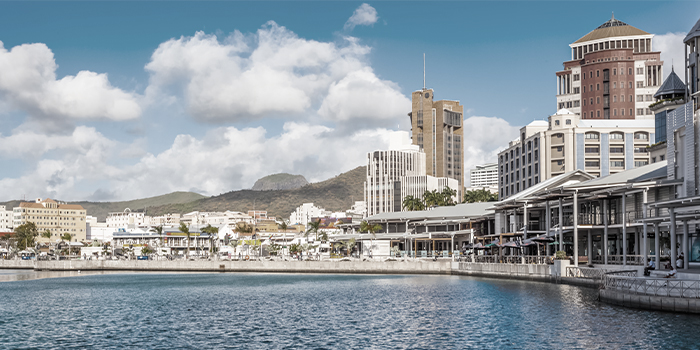Mauritius Budget improves ‘Ease of Doing Business’ and progresses ‘Substance’

The Mauritius 2022-23 Budget, which was published on 7 June, included several measures affecting the rules governing the international financial centre. Further reforms of the legislative framework are also to be introduced to converge the domestic and global business regimes.
“The single regime in the financial services sector is a landmark announcement as Mauritius continues its progress to become an international financial centre of substance, fully compliant to international norms,” said Ken Poonoosamy, Chief Executive Officer of the Mauritius Economic Development Board.
“The provision for a top-up tax on GBCs also sends the right signal in this direction.”
“Following the tremendous effort made to bring Mauritius to the 13th place in the last World Bank’s Doing Business Report, a new series of reform is being canvassed, notably the regulatory review exercise in the tourism, logistics, healthcare and construction sectors. Key measures include reducing delays in opening bank account and waiving incorporation fees. These will further position Mauritius as a destination of choice for doing business.”
“The EDB is once again called to deliver on a range of key schemes including the recently launched Digital Industries Academy, which will be transformed into an incubator in order to foster skills development in the digital sector. The EDB will also look after the newly announced Sustainable City Scheme and Transit Oriented Scheme, which will accelerate community-based development on sustainable mixed-use projects across the island.”
The principal elements of the Budget affecting the international financial sector are as follows:
- Ease of Doing Business – To promote business facilitation, a Business Regulatory Reform Bill will be introduced. There will be no fee to start a business and incorporate a company in Mauritius and the Bank of Mauritius will ensure that a bank account can be opened within one week, for an individual or a business when all relevant information has been received.
- Tax incentives – An eight-year income tax holiday will apply for a newly set up Freeport operator or developer making an investment of at least MUR50 million and that complies with OECD substance requirements.
- Work and Resident Permits – Holders of the Global Headquarters Administration licence will be provided with work and residence permits for five executives and their dependents.
- Premium Visa – Foreign employers of Premium Visa holders will not be subject to corporate tax and social contributions in Mauritius in respect of an employee.
- Resident Permits – Residential property acquired by more than one non-citizen under ‘fractional ownership’ will be eligible to apply for the status of residency provided that the investment by each non-citizen exceeds USD375,000.
- Resident Permit Holders – Acquisition of residential property of a minimum of USD350,000 will be permitted by Residence Permits holders outside the existing approved schemes, provided that 10% contribution is made to the Solidarity Fund.
- Base Erosion and Profit Shifting (BEPS) – To comply with international standards on BEPS, the Income Tax Act will be amended to introduce a local ‘top-up tax’ regime. Entities based in Mauritius that form part of a group impacted by the global minimum tax will be required to pay incremental taxes in Mauritius so that their effective tax rate in Mauritius is 15%. The local top-up tax will apply to MNE groups with global annual revenues of at least €750 million.
- Taxation of Digital Economy – Regulations will be extended to cover internationally agreed policies to address the tax challenges arising from digitalisation of the economy.
- Power to request for information – Information can be requested by the Mauritius Revenue Authority (MRA) in respect of foundations and trusts for the purposes of raising assessments, collection of tax or for compliance with any request for exchange of information under a double taxation agreement (DTA).
- International arrangements – International arrangements can be subject to alternative dispute resolution in case of cross border tax disputes and implementing internationally agreed standards to prevent BEPS.
- Family Offices – To attract high-net-worth individuals and families, the minimum portfolio required to manage a family office will be USD5 million.
- The Bank of Mauritius Act will be amended to clarify that the Bank can open accounts and accept deposits from persons for the purpose of issuing digital currency; and increase the functionalities of the Central ‘Know Your Customer’ system and the Central Accounts Registry established by the Bank, with a view to facilitating collection, verification, validation and extraction of KYC records.
- Companies Act – The Act will be amended to remove temporary time extensions for holding AGMs and preparing and filing financial statements and the relaxation of directors’ disclosure duties on that were provided due to the Covid-19 pandemic. It will also be amended to prohibit companies from being both registered in Mauritius and in another jurisdiction simultaneously and to ease the ability of the Registrar of Companies to remove and restore companies on the register.
- Financial Intelligence and Anti-Money Laundering Act (FIAMLA) – The Act will be amended to harmonise its provisions by including combatting of proliferation financing under its scope, in line with FATF requirements.
- Financial Services Act – The Act will be amended to remove ‘Global Headquarters Administration’, ‘Global Shared Services’ and ‘Global Treasury’ activities from the scope of ‘financial services’ under the Financial Services Act and to create a separate section for regulation of global activities in line with FATF requirements. It will also be amended to enable the Financial Services Commission (FSC) to initiate regulatory actions against non-approved individuals who have been performing the functions of an officer.
